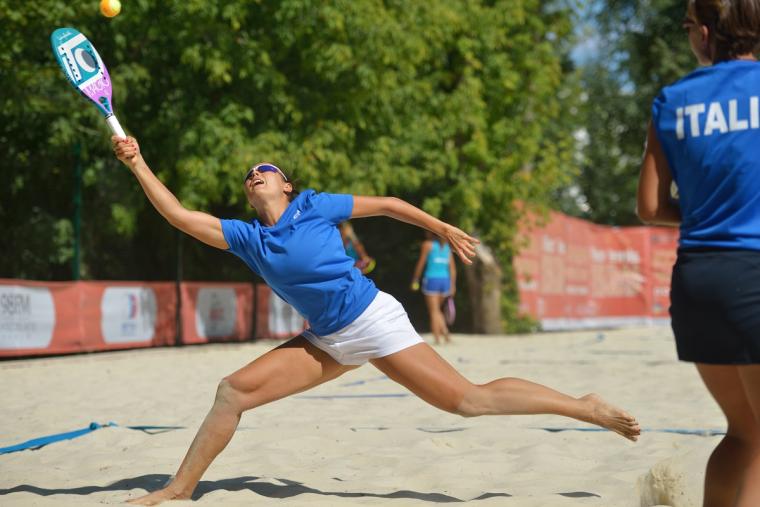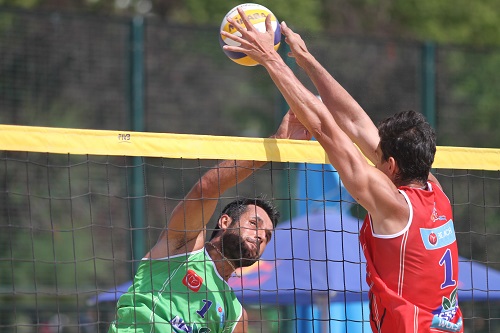
Beach tennis was one of the sports originally to be contested at the World Beach Games.
We’ve seen cities refuse to host the Olympics, or to be candidate cities, but the IOC still had years to find a replacement.
We’ve also seen hosting rights stripped away, too, but with time to locate a new host.
But having a host city resign from its duties with less than a month to go, forcing cancellation of the entire event, is a new one. The World Beach Games were set to run in Bali, Indonesia between August 5 and 12; that is, they were scheduled up until last week, when Bali abruptly pulled out, citing budget problems. Namely, the Indonesian Olympic Committee (KOI) claimed that they were forced to pull out after the budget was not released by the Government in Jakarta.
The event owner, the Association of National Olympic Committees (ANOC, not to be confused with the IOC) was even taken aback, according to the announcement, carried in Inside The Games:
"While there have been challenges in the Games preparations, as at any major multi-sport event, ANOC had been regularly assured by the KOI that solutions would be found and the Games would go ahead as planned," the umbrella organization said in a statement. "ANOC and the KOI met for weekly coordination meetings, as recently as last week, and at no point did the KOI indicate there were any issues that would lead to such an outcome."
Reuters notes, “Bali was set to host the second edition of the World Beach Games. Doha hosted the inaugural edition in 2019.”
About 1,500 athletes from 130 countries had been expected to attend the event, which would include air badminton, beach soccer, beach handball, beach karate, beach sprint (rowing), wing foil (also known as wing surfing), surfing, open water swimming, beach tennis, aquathlon, 4x4 beach volleyball, beach tennis, beach water polo and beach wrestling. The Games had originally been scheduled for 2021 but were postponed by the pandemic.
But if you thought Koi, Jakarta and ANOC (as well as anyone else involved) would sit quietly and let the news sink in, well, that’s a big nope. In fact, according to a subsequent article in Inside The Games, there’s been quite a bit of blaming and shaming. In fact, if finger pointing were an Olympic sport, there would be a knock-down, drag-out fight for the gold medal.
Indonesia's Sports and Youth Minister Dito Ariotedjo, for example, claimed that funding was in place to host the World Beach Games, but that "other issues" were behind the late cancellation of the event. And the Olympic Committee of Israel (OCI) said that Indonesia was trying to exclude them from competing and ANOC's insistence that they should be allowed to compete caused Indonesia to pull out of hosting the Games. (This could have merit as Indonesia was stripped of the hosting rights for the FIFA Under-20 World Cup due to the country's refusal to host Israel, who had qualified for the tournament.)
But cracks had been seen earlier in the foundation of the hosting process. Inside The Games notes, “Bali had been effectively awarded the Games at the ANOC General Assembly in Crete in October 2021, even though the country was banned at the time from hosting international events due to Indonesia's anti-doping organization being suspended by the World Anti-Doping Agency (WADA). The ban was subsequently lifted by WADA in February 2022 and Bali was confirmed as host by ANOC in June.”
Troubles continued, however; according to Wikipedia’s entry, “one month before the start, ANOC announced that the Games were likely to be cancelled because the Indonesian Olympic Committee (KOI) had withdrawn from the commitment to host 2023 ANOC World Beach Games. “
 But the Games themselves are no stranger to problems. The first iteration of the Games was scheduled for San Diego, to be held in 2017 but that was pushed to 2019. (While ANOC claimed the step was taken in order to allow national Olympic committees and international federations “optimum time to prepare their athletes” for the event, few believed it and most cited the cost of the Games and the inability to raise appropriate capital.)
But the Games themselves are no stranger to problems. The first iteration of the Games was scheduled for San Diego, to be held in 2017 but that was pushed to 2019. (While ANOC claimed the step was taken in order to allow national Olympic committees and international federations “optimum time to prepare their athletes” for the event, few believed it and most cited the cost of the Games and the inability to raise appropriate capital.)
On the surface, the World Beach Games seemed to have it all. The event was originally supposed to be a bonanza of beach sports (and sports associated with vacation), with representatives from all 206 National Olympic Committees participating in nearly 25 sports including beach-based track & field, wrestling, American flag football, beach tennis, beach volleyball, soccer, wrestling, handball, BMX, canoeing, Ultimate, surfing, jet skiing, triathlon, karate, taekwondo, skateboarding, marathon swimming, stand-up paddle boarding, climbing, water polo, windsurfing, esports and 3x3 basketball – although it was noted that more sports might be added.
But instead of adding more sports, the newly rescheduled Games went in the opposite direction. According to an article in Inside The Games, San Diego Exploratory Foundation leader Vincent Mudd told the Times of San Diego that his group had decided to aim for around 40 countries to participate in 17 sports, with a total of just over 1,300 athletes expected. However, Inside The Games noted, all 206 NOCs will be invited to send athletes. Later, it was announced that BMX cycling would be cut because of venue costs.
But that wasn’t all. The June prior to the event (if you’re keeping count, that would have been with three months to go), the Games were abruptly yanked from San Diego and moved to Doha, where an even more stripped-down version took place – although ANOC and Doha happily reported it had been an unprecedented success.
A formal statement from Vincent Mudd, chairman of the Games-organizing San Diego Exploratory Foundation, noted, “Due to challenges with securing the necessary sponsorships for the inaugural 2019 ANOC World Beach Games in San Diego this October, and the time sensitivity, we have regretfully learned the Association of National Olympic Committees has decided to withdraw the event from San Diego.
The San Diego Union-Tribune quoted Mudd as saying: “We were never looking for government funding, because in the U.S., you don’t have governments funding these games, so we needed these inaugural games to stand on their own by finding corporate sponsorships. And what we were unable to do was identify that corporate sponsor to fully fund the games. The issue was the companies wanted to see the games happen first and then jump on board for maybe the second edition. It’s not like we didn’t find corporate sponsors with $500,000 to give, but we needed capital to fund the entire games.”
In a separate article, Joe Terzi, chief executive of the San Diego Tourism Authority, admitted fundraising had been an uphill battle all along.
"There will be some negative press, but this is not a knock on San Diego," he told the San Diego Union-Tribune. “We’re not a city blessed with headquarter corporations; we don’t have the resources to go to a Microsoft or an Oracle, and it was an event that had never happened before.”
Whether (or when) ANOC decides to reschedule the 2023 World Beach Games is up for debate. Several other multi-sport events, the World Urban Games, World Combat Games and World Mind Games, have also had their troubles with cancellations and rescheduling through the years.
The Combat Games are currently scheduled for late October in Saudi, Arabia and are organized by SportAccord, an umbrella organization similar to ANOC. The other two events, World Urban Games and World Mind Games, were originally the property of the Global Association of International Sports Federations (GAISF); however, GAISF has since ceased operations, and while both the World Urban Games and the World Mind Games are listed on the SportAccord website, there has been no updated information on whether, when or where they will be held next.
The challenges facing international multi-sport events are daunting. Advertising and sponsorship funds are tighter than ever, athletes in many small sports are unable to pay their own way, and with so many individuals able to use personal devices to stream sports events, is there any percentage in the television advertising that might possibly bring in revenue?
So far, the Olympics and Pan-Am Games seem to be the only international multi-sport events succeeding cycle after cycle. And as the Olympics continue to showcase new sports, it may well be that many sports shown in these events will migrate over, leaving the events on the drawing board.

